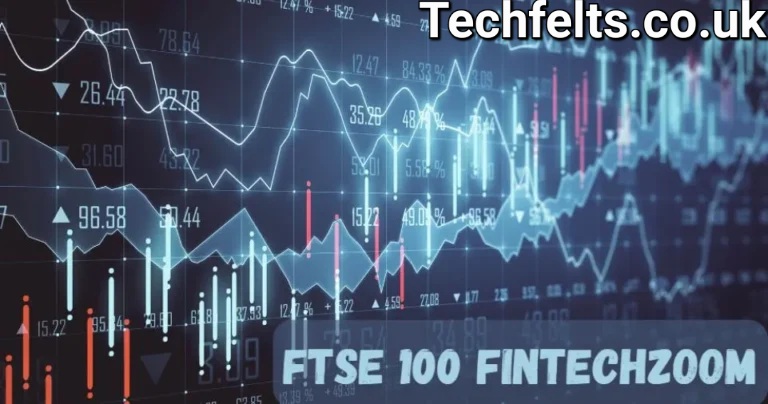The FTSE 100, the premier stock index of the London Stock Exchange (LSE), serves as a barometer for the UK economy and a critical benchmark for global investors. Comprising the 100 largest publicly traded companies in the UK by market capitalization, this index reflects the performance of industry giants like HSBC, BP, AstraZeneca, and Unilever. For traders, investors, and financial analysts, tracking the FintechZoom.com FTSE 100 provides real-time updates, expert insights, and predictive analytics to navigate market volatility and capitalize on emerging opportunities.
In this comprehensive analysis, we explore the latest market trends, key drivers of FTSE 100 movements, sector performance, and investment strategies—all powered by FintechZoom’s cutting-edge financial tools. Whether you’re a day trader, long-term investor, or financial enthusiast, understanding the FTSE 100’s dynamics is essential for making data-driven decisions.
Understanding the FTSE 100: A Market Overview
What is the FTSE 100?
The Financial Times Stock Exchange 100 Index (FTSE 100), often called the “Footsie,” was launched in 1984 with a base value of 1,000 points. Today, it represents the top 100 UK-listed companies across diverse sectors, including banking, energy, pharmaceuticals, and consumer goods. Unlike indices like the S&P 500 or NASDAQ, the FTSE 100 is heavily influenced by global economic conditions since over 70% of its revenues come from outside the UK.
Why is the FTSE 100 Important?
- Economic Indicator: A rising FTSE 100 signals investor confidence, while a decline may indicate economic uncertainty or recession risks.
- Investment Benchmark: Many pension funds, ETFs, and mutual funds use the FTSE 100 as a performance benchmark.
- Global Influence: Companies like Shell and HSBC operate internationally, making the index sensitive to currency fluctuations, trade policies, and geopolitical events.
How is the FTSE 100 Calculated?
The index follows a free-float market capitalization-weighted methodology, meaning:
- Only publicly tradable shares are considered (excluding locked-in shares).
- Larger companies (e.g., AstraZeneca, BP) have a greater impact on index movements.
- The index is rebalanced quarterly to adjust for market changes.
FintechZoom.com FTSE 100: Real-Time Tracking & Market Insights
Live Market Updates
FintechZoom.com provides real-time FTSE 100 price tracking, ensuring investors never miss critical movements. Key features include:
- Minute-by-minute index fluctuations (e.g., spikes due to earnings reports or geopolitical news).
- Top gainers and losers (e.g., banking stocks rising on interest rate hikes).
- Global market correlations (how the FTSE reacts to U.S. Fed decisions or Asian market trends).
Sector Performance Breakdown
The FTSE 100 is divided into major sectors, each reacting differently to market conditions:
1. Financial Sector (HSBC, Barclays, Lloyds)
- Interest rate sensitivity: Banks thrive in high-rate environments.
- Regulatory impacts: Post-Brexit policies and global banking reforms affect profitability.
2. Energy Sector (BP, Shell)
- Oil price volatility: Conflicts in the Middle East or OPEC+ decisions sway energy stocks.
- Renewable energy shift: BP and Shell’s investments in green energy influence long-term valuations.
3. Healthcare (AstraZeneca, GSK)
- Drug approvals and R&D: AstraZeneca’s COVID-19 vaccine boosted its stock in 2021.
- Regulatory risks: Patent expirations can impact revenues.
4. Consumer Goods (Unilever, Diageo)
- Inflation effects: Rising costs may squeeze margins.
- Global demand: Emerging markets drive growth for brands like Dove and Magnum.
FTSE 100 vs. Global Indices
FintechZoom allows investors to compare the FTSE 100 with:
- S&P 500: More tech-heavy; less exposure to commodities.
- DAX 40: Germany’s index, dominated by industrial and auto stocks.
- Nikkei 225: Japan’s benchmark, influenced by Yen fluctuations.
Key Market Trends Shaping the FTSE 100 in 2025
1. Geopolitical Uncertainty & Brexit Aftermath
- UK-EU trade tensions continue to impact export-heavy FTSE firms.
- Sanctions and global conflicts (e.g., Russia-Ukraine war) disrupt supply chains.
2. Inflation & Interest Rate Policies
- The Bank of England’s rate decisions affect banking stocks and bond yields.
- Stagflation risks could lead to defensive stock rotations (e.g., utilities, healthcare).
3. Tech & AI Integration
- Rolls-Royce and BAE Systems are investing in defense AI and automation.
- Fintech adoption (e.g., digital banking) boosts financial sector innovation.
4. ESG Investing & Green Energy Transition
- BP and Shell face pressure to reduce carbon footprints.
- Sustainable ETFs tracking the FTSE 100 are gaining popularity.
Investment Strategies for FTSE 100 Traders
1. ETFs & Index Funds (Passive Investing)
- iShares UK Equity Tracker mirrors the FTSE 100 with low fees.
- Dividend-focused ETFs capitalize on high-yield stocks like British American Tobacco.
2. Active Stock Picking
- Value stocks: Mining giants like Rio Tinto benefit from commodity booms.
- Growth stocks: AstraZeneca’s drug pipeline offers long-term potential.
3. Short-Term Trading (CFDs & Futures)
- Leverage FTSE 100 CFDs for intraday trading on price swings.
- Futures contracts hedge against market downturns.
4. Dividend Investing
- The FTSE 100’s average dividend yield (~4%) attracts income-focused investors.
- HSBC and GlaxoSmithKline are top dividend payers.
Risks & Challenges in FTSE 100 Investing
1. Market Volatility
- 2024 saw a 5.7% surge, but 2025 opened with swings due to US-UK tariff talks.
2. Currency Risks
- A stronger Pound hurts multinational earnings (e.g., Unilever).
3. Sector Concentration Risks
- Over-reliance on banking and energy leaves the index exposed to sector crashes.
Conclusion: Leveraging FintechZoom for FTSE 100 Success
The FintechZoom.com FTSE 100 hub is an indispensable tool for investors seeking real-time data, predictive analytics, and expert commentary. By monitoring live trends, sector shifts, and macroeconomic factors, traders can optimize their strategies—whether through ETFs, direct stocks, or derivatives.
As the UK’s economic pulse, the FTSE 100 remains a high-reward, high-risk playground for global investors. With FintechZoom’s insights, you can navigate its complexities and capitalize on opportunities in 2025 and beyond.
Read more: FintechZoom.com Gold: News, Latest Updates & Price Predictions



